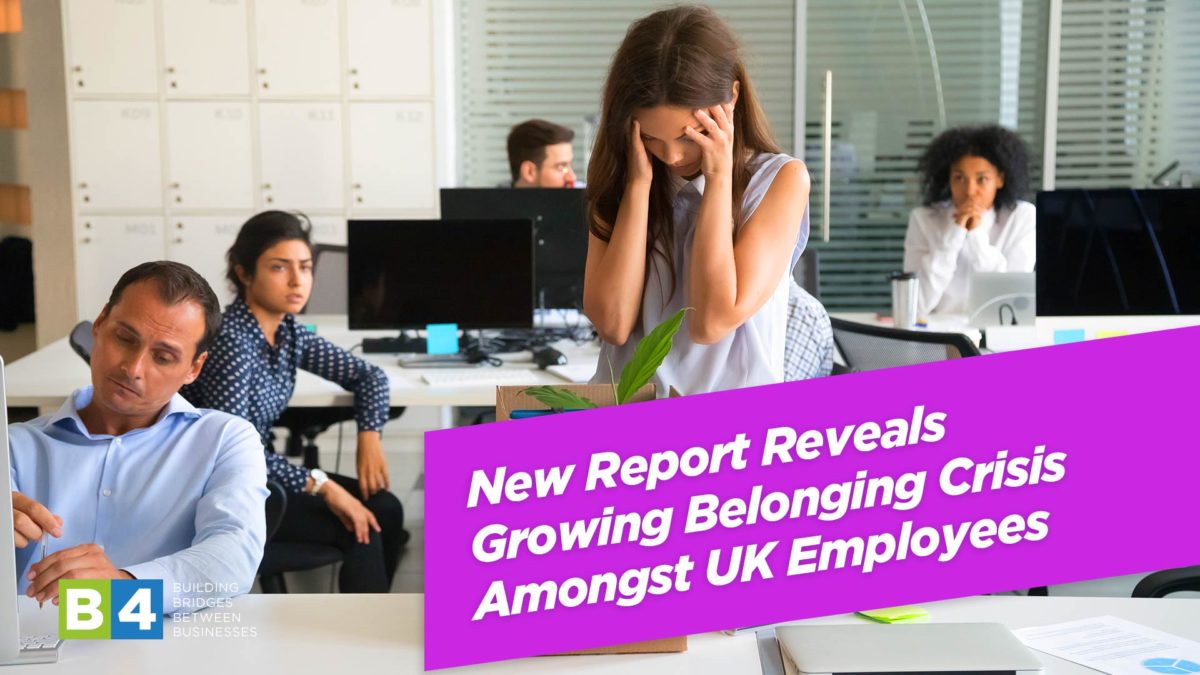
New Report Reveals Growing Belonging Crisis Amongst UK Employees
16 million UK office workers don’t feel as though they belong within their current company
- 72 percent of these individuals are considering leaving their role in the next 12 months
- This means 11.5 million workers are seriously reconsidering their roles
- The belonging crisis is 10 times bigger and twice as important than is being realised
The Belonging Crisis
New research has revealed a looming HR crisis amongst British businesses, with just a third of UK office workers feeling as though they belong within a company. This means that as many at 16 million employees are currently suffering from a feeling of isolation in the workplace.
This is set to have serious consequences for UK employers, with almost three quarters (72 percent) of those who don’t feel as though they belong considering leaving their job in the next 12 months. This equates to an incredible 11.5 million people thinking about imminently walking out of their current roles.
The research, conducted amongst UK office workers and HR professionals by Connectr, the leading HR tech platform for building businesses where people belong, reveals that the pandemic has changed employees’ priorities significantly, with emotional support and a sense of belonging valued more highly than ever before.
Whilst salary remains the number one priority for employees, only 63 percent of workers now view this as key to their happiness at work, seven percent less than in February 2020. This is making way for cultural benefits, with feeling valued being cited as the second most important workplace perk for UK office staff, overtaking the likes of annual bonuses and health insurance.
Similarly, 20 percent of workers now believe that having their individuality recognised is one of the most important workplace benefits. This has more than doubled since February 2020. Other benefits that have become more important to employees since the pandemic include being proud of the company they work for, having their opinions listened to, and being part of a supportive and inclusive team.
Millennials and Gen Z employees were found to be the driving force behind these workplace trends. Just 44 percent of 16-24-year-olds consider salary as the most important workplace benefit. With Millennials set to make up over 75 percent of the global workforce by 2025, this demonstrates a significant shift that employers will need to actively respond to in order to attract and retain talented and diverse individuals.
Challenges Being Overlooked by Employers
The research, published in a new report that explores the UK’s growing belonging crisis, demonstrates that this shift in priorities is going largely unnoticed by business heads, which is compounding the crisis. Just 14 percent of HR heads believe not fitting in is a key reason why employees leave a business, demonstrating a clear misunderstanding of the scale of the problem.
Even for those businesses which do want to focus on belonging, resource is preventing them from doing so. Four in five HR heads say they don’t have time to prioritise building a sense of inclusion, whilst a staggering 92 percent struggle to get buy-in from senior leadership. The pandemic has worsened the situation, with 89 percent admitting that belonging has become less of a focus as a result of COVID-19.
As well as increasing staff turnover, this oversight could also be having an impact on a business’s productivity, reputation, level of diversity and inclusion, and ultimately its bottom line. The research found that a strong sense of belonging makes employees more motivated, loyal, engaged, and ambitious, which has a huge impact on productivity.
Building a Sense of Belonging
When it comes to building a sense of belonging, nearly half of office workers state that feeling valued is crucial, with a third claiming that clear progression opportunities are essential if they are to feel as though they belong. A significant number of employees also cited access to digital employee engagement platforms and mentoring schemes as key to cultivating a sense of belonging. These digital tools are particularly important for employees who are working from home. Almost half (44 percent) of remote workers who managed to maintain a sense of belonging during the pandemic put this down to online support platforms or mentoring schemes.
Despite clear demand from UK workers for digital platforms designed to support staff, just a third of organisations use them, whilst only 28 percent offer mentoring schemes. This demonstrates a clear disparity when it comes to employees’ needs and the provisions being offered by employers.
What the Experts Say
Will Akerman, Founder and Managing Director at Connectr, comments: “The research demonstrates a huge imbalance between employee demands and businesses’ priorities. What’s more, the growing belonging crisis amongst British employees is going largely unnoticed, with many employers still failing to recognise the importance of building a sense of inclusion. In fact, the belonging crisis is 10 times bigger and twice as important than is being realised. If this isn’t addressed quickly, UK businesses are set to face a huge resourcing challenge which could be catastrophic for many who are still coping with financial impact of the pandemic.
“The good news is, there are solutions to the challenge. Our research clearly shows the important role that online employee engagement tools and mentoring platforms can have in building a vital sense of belonging amongst staff. The digital nature of these platforms makes them accessible to all and easy to roll out at scale, meaning that all employees can benefit, regardless of their background, level of seniority or where they are based. More needs to be done to tackle the UK workforce’s belonging crisis, and it’s the businesses that make a conscious and active effort to truly engage, support and nurture their staff that will come out on top.”
Belonging: Tackling HR’s Growing Crisis report is available to download free of charge now.
To find out more about Connectr, visit https://www.connectr.com
More in Workplace Wellbeing

Lost in Translation? Employees says CEOs Don’t Speak Their Language of Appreciation
Boostworks study reveals 65% employee dissatisfaction rate with
current benefit programmes

Psychological Safety: What does this mean, what should this look like...
At our last B4 People Ecosystem, Lisa LLoyd of It’s Time for Change shared the following report:

Boostworks Appoints Former Vodafone Board Director as Executive Chairman
Mark Bond, previously Head of Customer Operations at Vodafone leads Boostworks Board
From this author

Pioneering planning scheme shortlisted for economic growth award
An exciting planning project in the Vale of White Horse has been recognised by being shortlisted for an industry award.

Pioneering Careys Construction Campus to be piloted at Oxford North
Oxford North, the new £700 million innovation district in Oxford, is to welcome Careys Construction Campus to provide free, flexible on-site ground working construction training which will guarantee an offer of an interview on completion of the training and boost jobs and talent in the industry.

Projects at Nicholsons
Nicholsons has built a strong reputation for delivering exceptional landscaping and forestry projects across a diverse range of clients. From small private domestic gardens to large-scale commercial developments, the company continues to push the boundaries of creativity and sustainability in landscape design.


